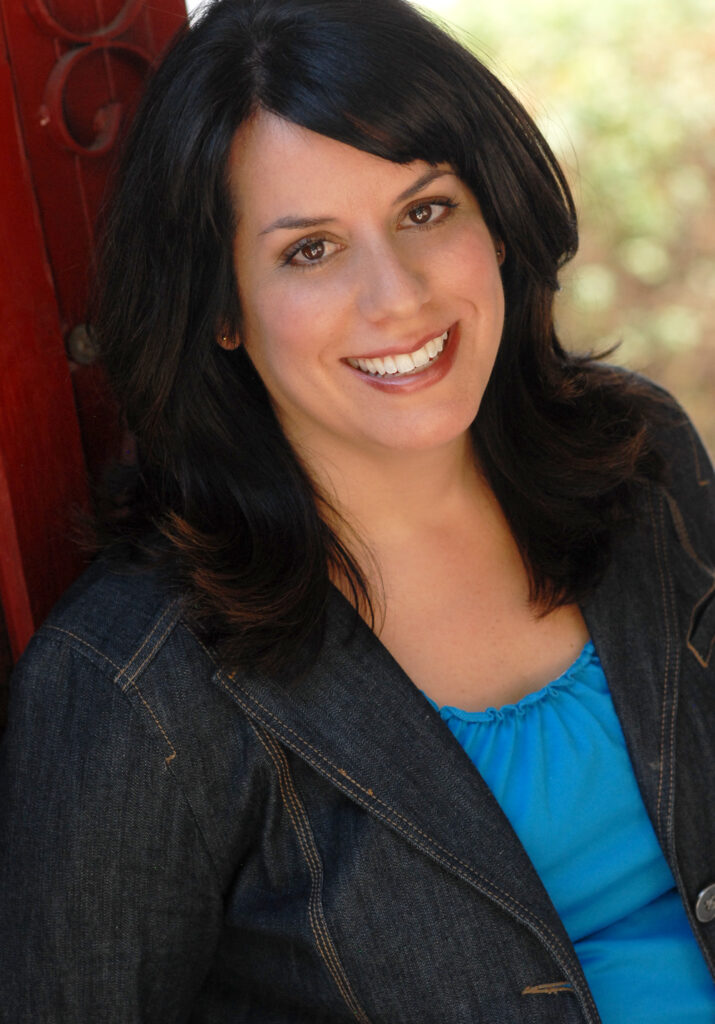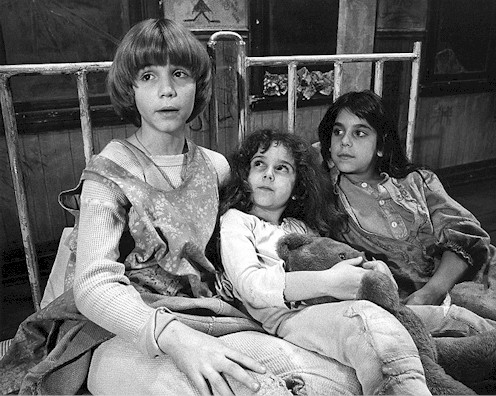How did you become involved in Annie?
I got my start in the Third National Tour of Annie. Rosanne [Sorrentino] was Annie and I was Tessie. I had gone to New York for the day with my mom to meet with a modeling agency. They took one look at me, with my dark hair and dark eyes, and told my mother I was too”ethnic-looking,” which I guess was not considered marketable at that time. We were a bit disappointed but decided to make the most of the day in New York.
As we were walking through the theater district, we passed by the stage door of the theatre where Annie was playing. The security guard wasn’t there so I walked right through the door and wound up in the wings during an understudy rehearsal. The Stage Manager noticed us standing there and asked if he could help us and I said, “I want to be in Annie!” He asked me to come onstage and sing “Happy Birthday,” which I did and then he told me to come back at 6:00. As it turns out, I crashed a third callback for the show! I didn’t make the cut that time, but three months later, I went on another Annie audition and ended up getting cast as Tessie. After 6 months on tour, I returned home and then a year later, I was offered the role of Pepper on Broadway.
Having played both Tessie and Pepper, was there one role you liked more than the other?
When I was Tessie in the Third National Tour, I was a very popular orphan with the audience! Martin Charnin, the Director, gave me a lot of Molly’s lines, so I felt like I really stood out. I really enjoyed playing Tessie.
When I was offered the role of Pepper in the Broadway cast, I was one of the oldest children, so it felt right to play that role. I had a good time playing Pepper. It was fun to throw Molly around! Actually, those two roles fit me perfectly at the time that I played them. It was a nice transition to go from playing Tessie to Pepper.
Why did you decide to make Life After Tomorrow?
I was inspired by the desire to reconnect with the girls personally. I wanted to find out what had happened to them. That morphed into, “Hey, I have a scanner! I’ll put some photos, playbills and programs together and get them online!” Annieorphans.com was really meant to just be a personal site, consisting of a list of the names of the girls that had appeared in the stage and film versions of Annie. I figured that people might do a web search for their name and end up on my site, which is what ended up happening.
Up until then, I hadn’t talked about Annie in a long time. Suddenly, fans started writing to me via the website and they seemed to consider me an expert on Annie! I quickly realized that there is a huge fan base that loves Annie now as much as they did back in 1977.
What happened after you launched the website?
After reconnecting with some of the girls online, we decided to have a real get-together in person. The first official reunion was held at the ice cream parlor, Serendipity, in NYC, and about a dozen girls showed up. It was so fabulous to see some old friends and reconnect. I have a broadcast journalism background, so I decided to videotape the reunion and casually interview the girls, “just for fun”. The next year, I coordinated another reunion in Philadelphia and then one in Los Angeles.
After hearing the girls’ stories — some of them truly heartbreaking — I shared them with a friend who happens to be a producer. She thought the stories were amazing, and encouraged me to do something with them. We talked about how it had all the elements of a documentary so I put together a proposal and started sending it around to people in the industry that might be able to help me get it made. The journey began there, and it just all fell into place. I ended up meeting my partner on the film, Gil Cates Jr., through a personal friend and he helped us secure the financing to make the film. It rarely happens that way or that easily, but this time it did. I was very lucky that people responded to the story and were already familiar with the iconic show.
What makes Annie so magical for so many people?
There’s something about her optimism that speaks to people. In the play, Annie is going through a rough time, just as our country is now. The song, “Tomorrow,” speaks to it; it’s so powerful. There’s something about that song that makes people smile and feel that there’s hope. Annie is truly a magical show.
What was your own life like after tomorrow?
It was difficult. You don’t fit in with your friends anymore because you don’t have anything in common with them. It’s hard because you have something that you’re good at, and you want to keep doing, but your friends don’t want to admit that they’re curious about it, so they become jealous and mean.
Annie was an incredibly popular show during its original run from 1977-1983. Not every community theater could produce it back then because the rights were not available. The only way you could be in Annie was to go to New York to audition for the professional production. Kids came from all over the country. So to have that kind of experience — from the rave reviews, to people telling you how wonderful you are — it sets the bar very high. It makes you crave and want it all the more. Fame is an alluring thing. You can feel like a failure when you can’t duplicate it. Many of us tried to continue in show business after Annie, but there weren’t a lot of roles available for pre-teen or teenage girls. There weren’t the kid shows there are today, like Shrek, Billy Elliot or Mary Poppins. For many of us, the auditions stopped when we hit puberty.
Did you find it cathartic to make the documentary?
Yes, I got to see how the other girls transitioned out of it. For many of us, it was our first real job. Some of the girls can look back on it fondly and accept it for what it was. It was harder for those, like myself, who wanted to continue to have a career in show business but couldn’t find work. Most went back to school and enjoyed being a “normal” teenager.
What do you want viewers to take away from Life After Tomorrow?
I would hope that any parent watching the film would see it as a cautionary tale and think carefully before putting their child into an adult career at an early age. Once a hobby turns into a career, the child will be thrust into a completely different arena. Competing on a professional level required discipline, training, determination and talent. It is also very costly for a family because a child in show business needs headshots, lessons and trips to NY for auditions and all of that costs money that the child may never make back. Parents have to prepare their children for success and disappointment so that their self-esteem isn’t wrapped up in their career accomplishments. Show business is fickle and kids who are a hot commodity one year will be a has-been the next. I hope my film at least illustrates how challenging it can be for a young person to deal with having a career so young and how important good parenting is in order for children to be able to come away from the experience with their sense of self intact.
What is your life like today?
I still continue to work as an actress and singer in film/TV but I will always love theatre and do it when I have the time (sadly, it doesn’t pay well enough to be able to do it for a living). I live in Los Angeles now and am an acting coach for kids in film and television. I also do consulting and Internet coaching. I’ve been an on-set Studio Teacher for 16 years, responsible for the education and welfare of child performers working in TV shows and film in Los Angeles. I also teach Annie workshops, where I coach kids for the audition process.
I’m also developing more projects as a director and producer and am hoping to begin shooting a new documentary next year! It will continue the theme of child actors, since I know the subject so well, but this new film will explore the issue of their education, or lack thereof.
Are you still auditioning?
I am still pursuing it for myself. I love acting and performing.
Since you are so involved with Annie, do you think you would try out for another role in the show, like Miss Hannigan?
I think so! I definitely have a fondness for the show. In the same way I was a good Pepper and a good Tessie, I would be a good Miss Hannigan. But I always pictured her as a much older woman! So yes, I would try out for Miss Hannigan, but much, much later in the future!





